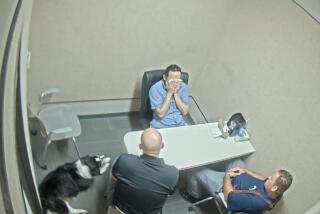The Tale of an Orthodox Christian ‘Prisoner, Priest, Spiritual Father’
- Share via
Orthodox Christians like to tell each other that their church is the “best-kept secret” in America. That’s one way to make sense of the puzzling fact that, though membership estimates range from 3 million to 6 million (record-keeping is not the faith’s strong suit), the church is mostly invisible to outsiders.
Other Americans might recall going to a Greek wedding once, or seeing Russians troop around their church with candles at midnight, but otherwise they have little awareness of this non-Protestant, non-Catholic, Christian body.
Thus, when something big happens in the world of Orthodox publishing, it’s mostly unknown outside church circles. Something big happened four years ago, with the publication of “Father Arseny: Priest, Prisoner, Spiritual Father.” This was a translation of a book that had already sold 400,000 copies in Russia, the first open publication of a battered manuscript that had previously circulated only underground in carbon copy.
Orthodox Americans immediately recognized “Father Arseny” as a spiritual treasure. The book is a collection of memoirs assembled by someone who calls himself “the servant of God, Alexander.” The essays describe a Russian priest through the eyes of many who knew him, both during his years in a Communist concentration camp and in the town where he lived until his death in 1975.
Father Arseny’s radical compassion and humility embody the distinctive flavor of Orthodox spirituality, and as such his story struck an immediate chord. For example, the book opens at dawn in the subfreezing gulag as the feeble, aging priest struggles to light a fire for the barracks. Clergy were despised by nearly everyone, even other prisoners; Christians were believed to be stupid. Yet in the course of this typical day, Arseny endures beatings and abuse with patience while caring for two sick prisoners and sharing his rations with them. One invalid is a criminal, and the other a deposed official who had signed Arseny’s own prison sentence. Eventually, they become converts and take the priest as their spiritual father.
The character of this kindly, long-suffering priest contrasts with the expectation of many Americans that a successful Christian leader should be glib, brisk, upbeat, forceful. Arseny represents a different kind of spirituality, one associated more with the desert ascetics and early Christians.
Arseny differs in another way: There are accounts of his contact with the supernatural. American Christian spokesmen live in an orderly, corporate sort of world, but Arseny is often shown at the crux of miraculous events. In one incident, he and a young man are thrown into a punishment cell, a small metal cubicle exposed to a temperature of 22 degrees below zero. The guards expected to find both dead when they unlocked the door 48 hours later. Instead, they found the prisoners rested and radiant, with a thick coat of frost on their clothing. As the young man described it later, when he collapsed in despair he saw the dark cell flooded with light, and Arseny praying in priestly garments. The young man, like most others who knew the priest, was transformed by his encounter.
These distinctively Orthodox elements, of humble compassion and spiritual power, are what made the first “Father Arseny” volume so beloved, and why the new volume has been eagerly awaited. “Father Arseny: A Cloud of Witnesses” continues the story with essays by people who knew him in the years after prison and, like the first, includes many tales of personal transformation and miracles.
When asked if other, similar samizdat works are waiting to be published, translator Vera Bouteneff responds, “I wish, I wish. Everything I’ve found so far was much too sweet.” Her own parents fled Russia soon after the revolution; her father had been sentenced to be shot, but the order was commuted to exile.
Bouteneff’s practical turn of mind is evident in the straightforwardness of the translation. Many other holy women and men lived during the Communist era, but Bouteneff has found those accounts to be overstated and saccharine. “Father Arseny” and “A Cloud of Witnesses,” which were written by many different people of different educational levels, preserve a winning directness. Those who would like to know more about Orthodox Christian spirituality can see it enacted in these books, worked out in human lives rather than in theory.
Soon after the publication of the first volume, a story went around the Internet: An Orthodox nun who had been reading the book one night turned out her light to go to sleep, looked back toward the book and it was glowing. Though she hadn’t heard the story, “I won’t deny it,” said Bouteneff. “I believe in miracles.”
More to Read
Sign up for our Book Club newsletter
Get the latest news, events and more from the Los Angeles Times Book Club, and help us get L.A. reading and talking.
You may occasionally receive promotional content from the Los Angeles Times.








